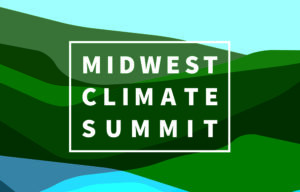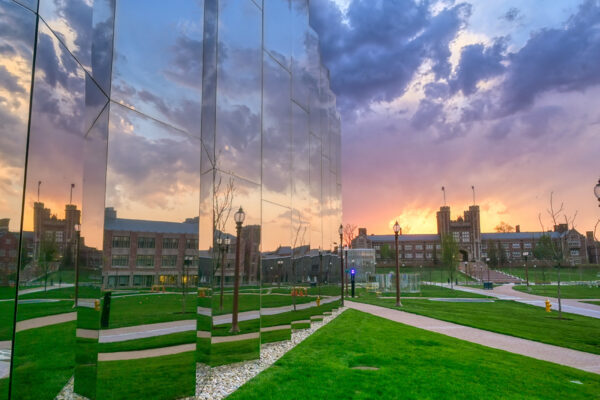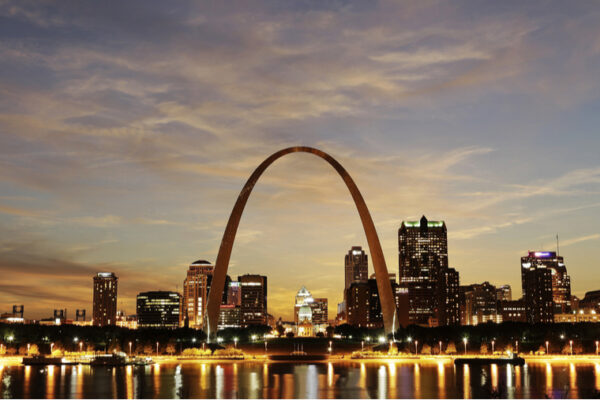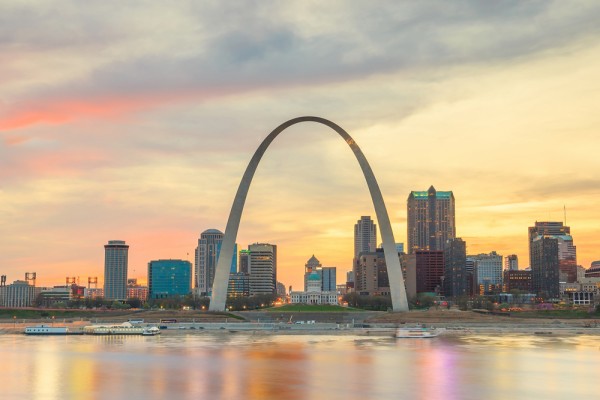
If the 12 states that comprise the Midwest were a country, they would be the fifth-largest greenhouse gas-emitting nation on the planet. On average, Midwest states lag behind the rest of the country on energy efficiency, de-carbonization of the electric sector, transportation electrification and green building.
At the same time, the Midwest is home to states, cities, businesses, institutions and organizations that are national climate leaders and can serve as models for others to increase ambition and action.
Working together to develop a collaborative and coordinated response to the climate crisis in the Midwestern region is the top goal of the upcoming Midwest Climate Summit, which Washington University in St. Louis developed in close partnership with many leading Midwestern organizations.
The event, presented with support from Bloomberg Philanthropies, was first announced during Michael Bloomberg’s visit to St. Louis in May 2019, when he served as the university’s Commencement speaker.
“The Midwest has the potential to play an important role in the coming critical decade to lower emissions, create a thriving green economy and ensure a just and equitable transition that does not leave any of our rural, suburban and urban communities behind,” said Phil Valko, assistant vice chancellor for sustainability. “We are thrilled to be joining forces with more than 20 other Midwestern universities, nonprofits and local governments to bring the Climate Summit to life, and we look forward to working together on substantive climate solutions for our region.”
The first portion of the Midwest Climate Summit consists of a virtual series of events called the Think Tank. The Think Tank kickoff begins at 10 a.m. CDT Oct. 2 and features keynote speaker Robert Bullard, an internationally renowned, award-winning environmental researcher, scholar and author.
A set of 13-minute TED-style talks also will be presented by speakers, including:
- Isra Hirsi, co-founder of the U.S. Youth Climate Strike;
- Chris Caldwell, president and director of the Sustainable Development Institute at the College of Menominee Nation;
- Katharine Wilkinson, author, strategist, teacher and editor-in-chief at Project Drawdown; and
- Heather McTeer Toney, national field director at Moms Clean Air Force.
Four additional Think Tank sessions will take place Oct. 9, Oct. 23, Nov. 6 and Nov. 20. Each of these sessions will begin with a keynote address, followed by a series of workshops focused on climate action, science and research, teaching and education, and outreach and engagement.
“We are excited for the opportunity to have in-depth conversations with Midwestern community and academic experts around our key topic areas,” said Beth Martin, teaching professor in environmental studies in Arts & Sciences and interim director of Washington University’s Climate Change Program. “These conversations will allow us to share best practices, identify gaps and facilitate meaningful discussions on outcomes that will help us advance climate action locally and throughout the region.”
The Think Tank sessions — which are free and open to the public — will lay the foundation for a high-profile spring 2021 summit, where cross-sector organizations throughout the Midwest will reconvene to announce new tangible climate actions, expanded commitments and new cross-sector partnerships.
“We see the spring summit as both a chance to reflect on our progress, and as a platform to catalyze additional climate partnerships and commitments that will help establish the Midwest as a leading center of climate efforts,” said David Fike, professor of earth and planetary sciences and director of environmental studies, both in Arts & Sciences, and interim director of the International Center for Energy, Environment & Sustainability.
The Midwest Climate Summit also seeks to actively engage students in both the sessions and a Climate Stories Contest. The Climate Stories Contest is an art competition that calls upon students to tell the story of climate change in the Midwest and how it is impacting them or their communities through artwork, film/photography, written works and performing arts. Submissions will be accepted starting in late September; instructions will be provided on the summit website.
A student systems conference and virtual job and networking fair are also planned for November, giving undergraduate and graduate students a platform to learn and connect with organizations leading on sustainability and climate across the Midwest.
To learn more about the Midwest Climate Summit, and to register for the Think Tank kickoff and subsequent sessions, visit the summit website.


